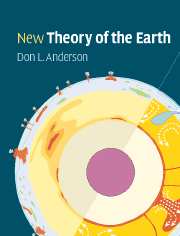Book contents
- Frontmatter
- Contents
- Preface and Philosophy
- Abbreviations and acronyms
- Part I Planetary perspective
- Part II Earth: the dynamic planet
- Part III Radial and lateral structure
- Part IV Sampling the Earth
- Chapter 12 Statistics and other damned lies
- Chapter 13 Making an Earth
- Chapter 14 Magmas: windows into the mantle
- Chapter 15 The hard rock cafe
- Chapter 16 Noble gas isotopes
- Chapter 17 The other isotopes
- Part V Mineral physics
- Part VI Origin and evolution of the layers and blobs
- Part VII Energetics
- References and notes
- Appendix
- Index
Chapter 12 - Statistics and other damned lies
Published online by Cambridge University Press: 05 June 2012
- Frontmatter
- Contents
- Preface and Philosophy
- Abbreviations and acronyms
- Part I Planetary perspective
- Part II Earth: the dynamic planet
- Part III Radial and lateral structure
- Part IV Sampling the Earth
- Chapter 12 Statistics and other damned lies
- Chapter 13 Making an Earth
- Chapter 14 Magmas: windows into the mantle
- Chapter 15 The hard rock cafe
- Chapter 16 Noble gas isotopes
- Chapter 17 The other isotopes
- Part V Mineral physics
- Part VI Origin and evolution of the layers and blobs
- Part VII Energetics
- References and notes
- Appendix
- Index
Summary
The remark attributed to Disraeli would often apply with justice and force: ‘There are three kinds of lies: lies, damned lies, and statistics’.
Mark Twain[‘lies, damn lies – and statistics’ (sic) – usually attributed to Twain (a lie) – or to Disraeli (a damn lie), as Twain took trouble to do; Lord Blake, Disraeli's biographer, thinks that this is most unlikely (statistics)].
Overview
Semantics, rhetoric, logic and assumptions play a large role in science but are usually relegated to specialized books and courses on philosophy and paradigms. Conventional wisdom is often the controlling factor in picking and solving problems. This chapter is a detour into issues that may be holding up efforts to develop a theory of the Earth, one that is as paradox free as possible.
A large part of petrology, geochemistry and geophysics is about sampling the Earth. Sampling theory is a branch of statistics. If the mantle is blobby on a kilometer scale, then individual rocks will exhibit large scatter – or variance – but the mean of a large number of samples will eventually settle down to the appropriate mean for the mantle; the same mean will be achieved in one fell swoop by a large volcano sampling a large volume of the same mantle. If the outputs of many large volcanoes are plotted on a histogram, the spread will be much smaller than from the rock samples, even though the same mantle is being sampled.
- Type
- Chapter
- Information
- New Theory of the Earth , pp. 143 - 152Publisher: Cambridge University PressPrint publication year: 2007



